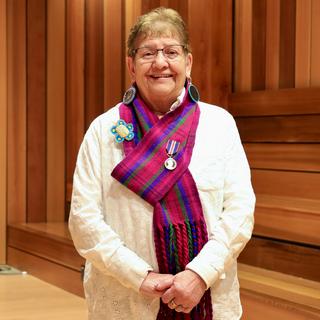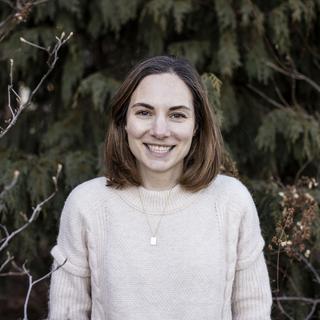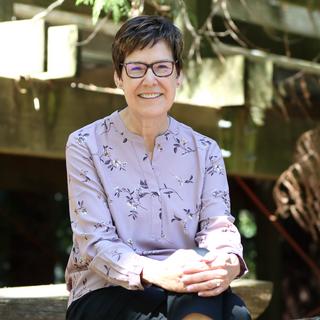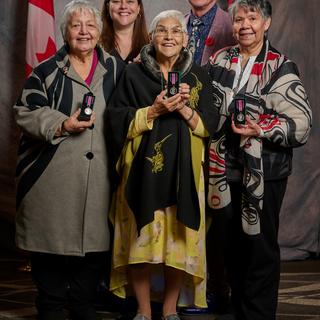Dr. Georgina Martin tells her personal story in Drumming Our Way Home: Intergenerational Learning, Teaching, and Indigenous Ways of Knowing. Focal Point Studios photo
Dr. Georgina Martin is hosting a book launch on October 22, from 4:30 to 6:30 pm, at VIU’s Malaspina Theatre at the Nanaimo campus.
Dr. Georgina Martin’s new book Drumming Our Way Home: Intergenerational Learning, Teaching, and Indigenous Ways of Knowing draws inspiration from her Secwépemc culture and the teachings of her grandparents.
It is an autobiographical journey that blends Indigenous Ways of Knowing and insight into cultural identity, reconnection through healing and intergenerational learning. Martin, a Vancouver Island University (VIU) Indigenous/Xwulmuxw Studies Professor, tells her personal story in Drumming Our Way Home. Her voice is joined by Elder Jean William and youth Colten Wycotte, who share their own familial and community experiences.
Martin is hosting a book launch for Drumming Our Way Home on October 22, from 4:30 to 6:30 pm at VIU’s Malaspina Theatre (Building 310) at the Nanaimo campus. To attend please RSVP by Friday, October 18 to ensure your place. We asked Martin to share insights into the writing of this book:
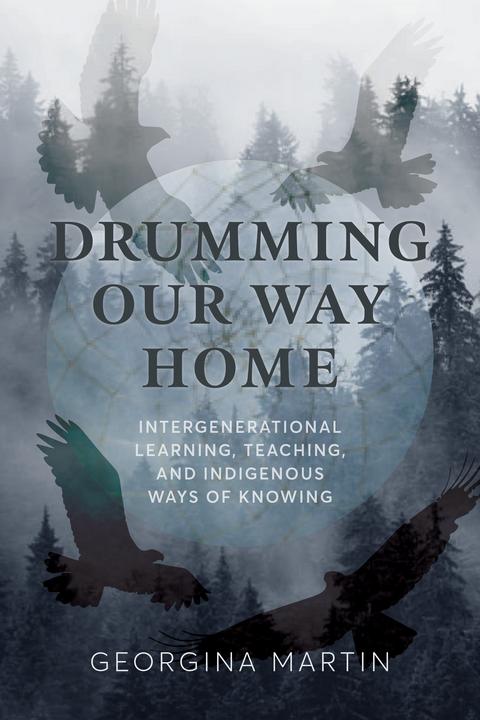
What inspired you to write Drumming Our Way Home?
I was inspired by the teachings of my grandparents, especially my grandfather, who told me to never forget who I am and where I come from. When I entered university, I lacked confidence and self-esteem yet I had the strength to keep my grandfather’s vision at the forefront. He always encouraged me to get an education and bring it back to my people.
It was not until I arrived at the University of British Columbia that I decided that I would not walk through the doors of academia and leave myself on the doorstep. I wanted my research to focus on something that would support the history of the Secwépemc people because this is the nation I am from, and I am positioned to assist in sharing and speaking our truth. I wanted to help our people advance, share stories from our voice and bring myself along.
Drumming Our Way Home is a combination of personal stories of three Secwépemc people that teach about our ways of knowing and being from our standpoint. I wanted to ensure that we are in the driver’s seat telling these stories. I garnered my strength and courage from Indigenous scholars that have gone before me.
I had two solid anchors when I made the decision to speak our truth. This came from Kirkness and Barnhardt (1991) in their pivotal article, the Fours Rs – respect, relevance, reciprocity and responsibility. Their message is for Indigenous students to enter academia on an equal footing. Their ideas helped me to make the shift and to feel good about my ideas and proceed with my search around identity. I was supported and coached by Dr. Jo-ann Archibald Q’um Q’um Xiiem OC from the Sto:lo First Nation. Her guidance helped me to believe in myself and my ability to pursue original and personal teaching stories.
What is the significance of the book’s title?
Hand drumming is our culture. The Hand Drum represents our rootedness to our homeland and connection to community. There are several teachings in the book around the Hand Drum’s significance. The Drums anchor us and guides us. During the process, I had to remain true to my community and my nation, so the Hand Drum represented protocol and protection.
The Hand Drum carries a very high honour in our culture, similar to an eagle feather. To do this work in a good way, I had to be grounded in who I am and where I come from. The Hand Drum reminded me about why I was doing this work and who I was doing it for. The connection to the Hand Drum is outlined as my epistemic and theoretical foundation. The Drum carries cultural and wholistic significance in many areas of Indigenous experiences and it aligns with other cultures according to their interpretation.
How do you hope your book will impact readers?
My hope is that the book will resonate with readers on many different levels. The stories shared in the book are giveaways which extend from Dr. Archibald’s Indigenous Storywork: Educating the Heart, Mind, Body and Spirit. The stories are personal from three different perspectives. It tells about current lived-experiences, stories of long ago and the perspective of Indigenous youth.
The book will speak to readers across intellectual, socio-economic and cultural borders. It has a wide appeal for anyone learning about the self through self-examination while moving to self-actualization. It is an Indigenous approach that incorporates the care and reflexivity of Storywork as a teaching and learning model. My hope is that it resonates with anyone seeking to engage in reconciliation and cultural interface between Indigenous and non-Indigenous people.
Your book is a resource for all individuals on their journey of identity exploration. Can you share more?
Regardless of background and culture, I am convinced that the book will touch many lives. My story is grounded in lived experiences that many Indigenous people can relate to. The outreach will be felt by non-Indigenous people as well who are in search of their identities like adoptees for example. Many challenges of lost identity reside in our DNA. The book can be a reawakening of the spirit which unlocks the mind and body. Our hope is that the sharing of our personal stories will enlighten readers to consider their own histories and support them on their paths of rediscovery. The stories are meant to be teaching stories.
How does your book offer insights into intergenerational learning and cultural understanding?
The strength of the book is intergenerational knowledge transmissions from knowledge keepers to youth. The passing on of Indigenous knowledge was mainly through oral teaching. Through contact, a lot of our ways of knowing and being has diminished. The book offers insights of the importance of grandparents as teachers and caregivers. The strength of the three of us come from our grandparents and their influence in our lives. Their teachings kept us informed of our beginnings and the importance of being Secwépemc. I still follow the teachings of my grandparents, and I do my best to honour and respect them.
-30-
Media Contact:
Rachel Stern, Communications Officer, Vancouver Island University
C: 250.618.0373 l E: Rachel.Stern@viu.ca | X: @VIUNews
The VIU community acknowledges and thanks the Snuneymuxw, Quw’utsun, Tla’amin, Snaw-naw-as and Qualicum First Nation on whose traditional lands we teach, learn, research, live and share knowledge.

